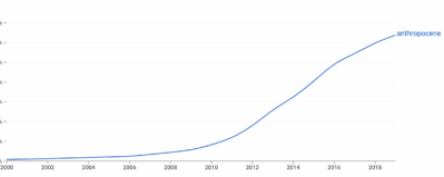Keeping up with the scholarly literature on the Anthropocene, or even on the humanities-relevant Anthropocene, has become a full-time job, and no one I know is paid to do that full-time. (All of the Anthropocene literature is arguably humanities-relevant, but not to the same degree.)
To give a sense of the numbers: I counted a total of 102 different books published in the last three years alone (2019 through 2021) that were available for downloading on a popular file-sharing (a.k.a. book pirating) site. Again, that’s publicly available copies of books being shared for free. That is a fraction of all the published books on the topic, and an even tinier fraction of all the publications, which include journal articles, reports, theses/dissertations, and materials in the popular press. (Google Scholar returns 44,800 publications, mostly scholarly journal articles, with the word “Anthropocene” since 2018.) Just reading those 102 recent books alone — books that most people around the world with an internet connection can get copies of with a few clicks — would take some time.
Here are a few thoughts on what this might mean.
1) If it’s impossible for specialists to keep up on the literature (and frustrating to try), it’s certainly impossible for the general public to do that.
2) As with all scholarship, there are sites — journals, web sites, and other mediators, as Latour might call them — that serve as arenas where the published literature gets reviewed, discussed, distilled, and transformed into more accessible forms of meaning. None of them come close to covering all of this literature (because there’s so much of it), but at least some of the better known authors, bigger publishing houses, better-marketed books, or genuinely novel ideas might rise to the top and affect the overall discourse in one way or another. That takes a bit of time to happen.
3) That said, the Anthropocene discourse is not just any discourse. (I’m reminded of John Hartigan, as far back as 2014, calling it a “charismatic mega-category.”) It has become, or at least is proposing to become, an épistémè in the Foucauldian sense of the term. It has reconfigured the ways scholars think of things, making certain concepts, connections, and disciplinary (and transdisciplinary) practices possible, and rendering others less conceivable. It is proposing to do that for the entire definition of humanity, which, far from disappearing — like “a face drawn in sand at the edge of the sea,” as Foucault proposed could happen with the next “fundamental rearrangement of knowledge” — is being geologized into a layer of eternity and into a kind of thickly incontrovertible present.
To be more specific, the Anthropocene discourse has made it possible for a large swath of scholarship (potentially all?) to address the present as if it is both the culmination of a lengthy process — a good one, a bad one, or just a long, climaxing crescendo, that more or less equates with the “humanization of the Earth” — and the beginning of a novel situation that is in many ways overdetermined (there’s “no going back,” it all depends on “us”) and in other ways deeply underdetermined (the future is wide open, with extinction being at one end of the range of possibilities and some grand anthro-techno-singularity at another).
Criticisms of the Anthropocene — the concept, the discourse, the thing itself — abound, but none of them rivals the discourse itself in any serious way. At least it isn’t evident from the literature how it would do that.
4) All of that may be claiming too much. That it has become the term du jour, or even of the decade, hardly means it will become the term to reconfigure all knowledge. No journal with “Anthropocene” in its title makes it into Google Scholar’s 100 top English-language journals. Google’s Ngram shows that the term’s upward curve may be plateauing like a wave of a Covid variant, not accelerating exponentially to some indisputable singularity.

For that matter, the term may be new, but its epistemic implications have been around for decades. They are deeply modern — which means that they instanciate modern, elite, western, masculinist, colonialist ideas of human self-identity (as “humanity”) and history (as “progress”). Critiques of those ideas have arisen all along (romantic critiques of industrialism, anti-modern critiques of modernization, et al.), and the more critical strains of Anthropocene discourse (which propose alternate terms like Capitalocene, Manthropocene, et al.) are no different. The Anthropocene is in this sense an update of “reflexive modernization,” with a geological spin.
5) With that in mind, then, maybe we can all take a moment to catch our breath. Those of us who work with, or against, the concept of the Anthropocene could feel assured that it won’t run away from us. Most of those books coming out aren’t making radically new claims, and if they are, we will hear about them sooner or later. The only reason to rush our own books (and articles) to print is for our tenure and promotion dossiers. There may be more important things in life, from just living to cultivating those alliances of life that inform our scholarship — alliances with neighbors and fellow activists, collaborations with artists and musicians and curators and others whose work will proceed with us only if we are around to talk to and play with them.
There, that makes me feel better. How about you?
